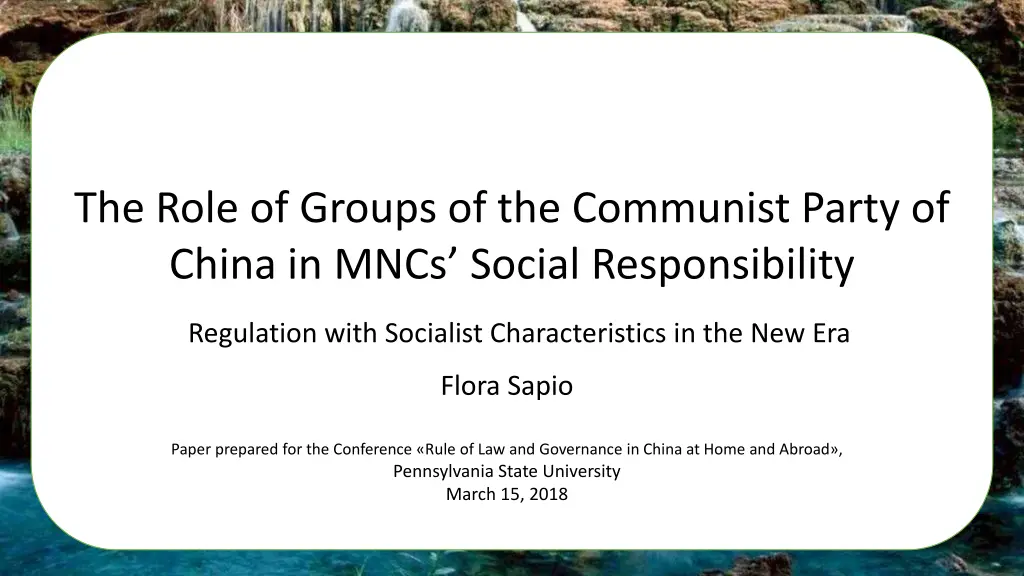
Groups of the Communist Party of China in MNCs' Social Responsibility Regulation
Explore the role of Communist Party groups in regulating social responsibility within MNCs in China with socialist characteristics. The analysis delves into the intersection of party oversight, clean governance, and international competitiveness, emphasizing goals of inclusiveness and sustainability.
Download Presentation

Please find below an Image/Link to download the presentation.
The content on the website is provided AS IS for your information and personal use only. It may not be sold, licensed, or shared on other websites without obtaining consent from the author. If you encounter any issues during the download, it is possible that the publisher has removed the file from their server.
You are allowed to download the files provided on this website for personal or commercial use, subject to the condition that they are used lawfully. All files are the property of their respective owners.
The content on the website is provided AS IS for your information and personal use only. It may not be sold, licensed, or shared on other websites without obtaining consent from the author.
E N D
Presentation Transcript
The Role of Groups of the Communist Party of China in MNCs Social Responsibility Regulation with Socialist Characteristics in the New Era Flora Sapio Paper prepared for the Conference Rule of Law and Governance in China at Home and Abroad , Pennsylvania State University March 15, 2018
CSR With Socialist Charactericts in the New Era Party Groups Inspection Tours Party State Voluntary Transnational SASAC Consultative Bodies Regulation Actors Local and Global Societal Actors Party Leadership and Oversight Party Remedial Mechanisms Big Data Ranking and evaluation algorithms Inclusiveness, transparency, sustainability Clean Governance Labor, safety, quality International Competitiveness Mechanisms Goals
CSR in Chinese Party-State Constitutionalism CPC Regulatory System State legal system Political task Binding on: Declaratory, non-binding provisions - Party members, and institutions (5, Company Law; 7, Partnership Enterprises Law) - All enterprises with a Party group
CSR and the Party Constitution Xi Jinping Thought on Socialism With Chinese Characteristics for a New Era 11, Preamble: principal contradiction between the People s evergrowing needs for a better life and unbalanced and inadequate development. People-centered, innovative, coordinated, green, and open development that is for everyone. 20, Preamble: socialist ecological progress Includes, and builds upon the concept of a comprehensive, sustainable, coordinated growth that respects man and the natural environment (Scientific outlook on development)
Social Responsibility and Party Organizations 25% - Party members in State-owned MNCs
Social Responsibility and Party Organizations Inspection Tour Groups of the Communist Party Group of the Communist Party of China
Social Responsibility and Party Organizations Groups of the Communist Party of China in State-Owned MNCs Overlap with corporate governance organs Implement Party regulations on social responsibility, and clean governance Monitor the conduct of all Party members Monitor subsidiaries of State-Owned MNCs Maintain coherence and consistency between the Party line and corporate conduct Vicarious liability
Social Responsibility and Party Organizations Inspection Tour Groups Party organizations external to State-owned MNCs Composed by Party investigative and anti-corruption organs, and by Party organization departments External, comprehensive audits lasting from 30 days to 3-4 months Organized by the Central Committee of the CPC and/or by SASAC
Goals of Party Organizations Political Goals External audits: - Compliance with Party regulation - Compliance with state regulation - Compliance with enterprise self-regulation - Compliance with domestic and international standards on safety, labor, environmental emissions, etc. Providing remedial mechanisms Guidance, practical information and assistance with CSR compliance Referral to judicial organs
Mechanisms of CSR in the New Era Publicity SASAC Report to the National People s Congress MNCs Report to Party Groups MNCs Report to Inspection Tour Groups MNCs Disclosure of Audits by Inspection Tour Groups National Enterprise Credit Information Publicity System Conventional CSR Reports
Mechanisms of CSR in the New Era Ranking and Evaluation Social Responsibility is an important component of the evaluation of political quality Evaluation and ranking mechanisms internal to the Party Use of domestic and transnational non-binding guidelines on social responsibility Use of domestic standards on CSR, safety, social credit, etc. Evaluation and ranking mechanisms targeted to State-owned MNCs Computation of social credit scores Blacklisting of non compliant enterprises
Opportunities and Challenges of Social Responsibility in the New Era Opportunities # 1. Consistent with global approaches to social responsibility. Party membership creates binding obligations but the decision to join the CPC is entirely voluntary. # 2. Premised on multi-stakeholder approaches that value actors diversity and inclusion # 3. Use of non-state based, state based, societal, judicial and non-judicial mechanisms #4. Leverage not only by apex enterprises but by Party institutions as well
Opportunities and Challenges of Social Responsibility in the New Era Challenges # 1. Difficulty in conducting audits beyond third-tier subsidiaries # 2. All monitoring, assessment, audit and compliance systems are limited to the territory of the PRC # 3. Corporate social responsibility mechanisms based on non-state institutions are misunderstood and misrepresented #4. Partial coverage of Party-based CSR mechanisms






















